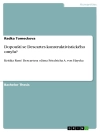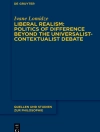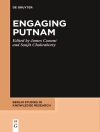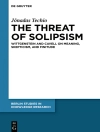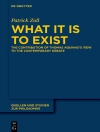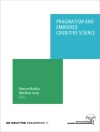All the great philosophical ideas of the past century—the philosophies of Marx and Nietzsche, phenomenology, German existentialism, and psychoanalysis —had their beginnings in Hegel; it was he who started the attempt to explore the irrational and integrate it into an expanded reasonwhich remains the task of our century. He is the inventor of that Reason, broader than the understanding, which can respect the variety and singularity of individual consciousnesses, civilizations, ways of thinking, and historical contingency but which nevertheless does not give up the attempt to master them in order to guide them to their own truth. But, as it turns out, Hegel’s successors have placed more emphasis on what they reject of his heritage than on what they owe to him.
Maurice Merleau-Ponty (1964)
Table des matières
Table of Contents
Acknowledgements
Foreward
Abbreviations
Introduction
The guiding question of this book
Towards a new Hermeneutic Approach to Reading Hegel
Overview of the Seven Chapters
Chapter 1. Hegel and NEGATIVITY: Tarrying with the NEGATIVE
1.1 Introduction
1.2 NEGATION as internal conceptual differentiation
1.3 Dialectics as the methodology of negation
1.4 Hegel’s law of absolute NEGATIVITY
1.4.1 The Absolute
1.5 NEGATIVITY in the Phenomenology of Spirit
1.5.1 NEGATIVITY as explained in the ‘Preface’
1.5.2 ‘Looking the NEGATIVE in the face and tarrying with it’
1.5.3 The phenomenological process as explained in the ‘Introduction’
1.5.4 Absolute Knowing as reconciliation
1.6. From phenomenology to ontology
1.6.1 NEGATIVITY in the Science of Logic
1.7 Chapter summary
Chapter 2. Feuerbach’s Humanistic Critique of Hegel and Negativity
2.1 Introduction
2.2 The three periods in the development of Feuerbach’s thought
2.2.1 The first period: In defence of Hegel
2.2.2 The middle period: Redefining Hegel’s NEGATIVITY
2.2.3 The late period: Hegel’s metaphysics as a theological philosophy
2.3 The beginning of Feuerbach’s independent spirit
2.4 The evolution of Feuerbach’s critique
2.5 Feuerbach’s new philosophy
2.6 Alienation and projection as Feuerbach’s mode of negativity
2.7 Chapter summary
Chapter 3. Marx and NEGATIVITY: Alienation and the Negative Power of Labour
3.1 Introduction
3.2 The demystification of Hegel’s dialectic of NEGATIVITY
3.3 From idealist speculation to materialist critique
3.4 NEGATIVITY as Marx’ Methodology
3.5 Alienation as Marx’ form of negativity
3.5.1 From objectification to alienation
3.5.2 The negative force within labour
3.6 Negation as the mode of changing existing reality
3.7 The power of negation in the proletariat
3.8 Chapter summary
Chapter 4. Adorno’s Critical Theory and Negative Dialectics
4.1 Introduction
4.2 Criticism as a negative force
4.3 Critical Theory as a philosophical praxis
4.4 Negativity in the Dialectic of Enlightenment
4.5 Adorno’s understanding of Hegel’s ‘determinate NEGATION’
4.6 Adorno’s Hegel: Three Studies and negative experience
4.7 Negative Dialectics as Adorno’s conceptualisation of negativity
4.8 Chapter summary
Chapter 5. Heidegger’s Ontological Difference and Destruktion of Metaphysics
5.1 Introduction
5.2 Heidegger’s relation to Hegel in his development of thought
5.3 The place of Hegel in Heidegger’s ‘Destruktion’ of the history of philosophy
5.4 Heidegger’s interpretation of Hegel’s concept of time
5.5 Hegel’s infinity of Spirit versus Heidegger’s finitude of being
5.6 Heidegger’s critique of Hegel’s concept of experience
5.7 Heidegger’s version of Hegel’s concept of NEGATIVITY
5.8 Ontology or theology?
5.9 Chapter summary
Chapter 6. French Philosophy, Hegel and NEGATIVITY
6.1 Introduction
6.2 The unhappy consciousness
6.2.1 Wahl’s existential dimension of the unhappy consciousness
6.2.2 Hyppolite’s ontological dimension of the unhappy consciousness
6.3 The logic of desire, the struggle for recognition and the master-slave dialectic
6.3.1 Kojève’s redefinition of the master-slave dialectic
6.4 Existentialist and Phenomenological Critiques of Hegel
6.4.1 Sartre’s ‘Other’
6.4.2 Merleau-Ponty’s hyper-dialectic
6.5 The Spectre of Hegel in Structural Marxism
6.5.1 Althusser’s Spinozian critique of Hegel
6.6 The philosophy of difference
6.6.1 Derrida’s ‘Différance ‘ versus negativity
6.7 French Psychoanalysis, deconstruction and NEGATIVITY
6.7.1 Lacan’s split subject
6.7.2 Žižek’s Hegelian and Lacanian reformulation of negativity
6.8 Malabou’s ‘plasticity ‘ as negativity
6.9 Chapter summary
Chapter 7. British and American Hegel Interpretations
7.1 Introduction
7.2 Hegel and negativity in British idealism
7.3 Russell’s and Moore’s rebellion
7.4 From analytic to post-analytic philosophy
7.4.1 Pippin’s reading of Hegel through Kant’s transcendental unity of apperception
7.4.2 Brandom’s negation as ‘material incompatibility’
7.4.3 Mc Dowell’s Hegelianised Kant and Kantianised Hegel
7.5 Chapter summary
Conclusion
Appendix
Works Cited
Primary Sources (Hegel)
Other Primary Sources
Secondary Literature
Index



